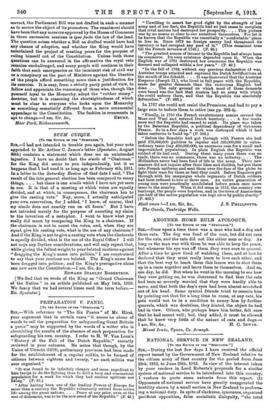PREPARATION V. PANIC.
[To TRY EDITOR 01 TEN " SPECTATOR."] SIR,—With reference to "The Six Panics" of Mr. Hirst, your argument that in certain cases " it_ seems an abuse of words to call the preparation for safeguarding Great Britain a panic" may be supported by the words of a writer who is chronicling the results of the absence of such preparation for safeguarding his own country. I refer to H. W. Van Loon's
" History of the Fall of the Dutch Republic," recently reviewed in your columns. He notes that though, by the Union of Utrecht (1579), preliminary provision had been made
for the establishment of a regular militia, to be formed of citizens between eighteen and twenty, "no such militia was ever organized."
"It was found to be infinitely cheaper and more expedient to hire troops to do the fighting than to drill a busy and commercial population for a work for which they had neither aptitude nor liking." (P. 35.) "After having been one of the leading Powers of Europe for more than a century the Republic voluntarily retired from active life among the great nations. . . . Peace at any price, even at the cost of dishonour, was to be the new creed of the Republic." (P.12.) " Unwilling to assert her good right by the strength of her army and of her fleet, the Republic had no just cause to complain that rival nations had destroyed her prosperity. . . . This picture was by no means so clear to our ancestors themselves. For let it be known that the Republic was essentially a 'comfortable' place to live in. Since 1672 no foreign enemy had threatened its territory or had occupied any part of it." (This remained true till the French invasion of 1745.) (P. 83.)
"The greatest source of income to the Republic had always been its commerce. Its very existence depended upon it. When the English war of 1781 destroyed her commerce the Republic was doomed and collapsed within a few years." (P. 49.) "In the fall of 1783, without any previous declaration of war, Austrian troops attacked and captured the Dutch fortifications at the mouth of the Scheldt. . . • It was discovered that the Austrian Emperor (Joseph II.), who lived in full peace with the Republic, made far greater demands than the victorious English had done. • . . The only ground on which most of these demands were based was the fact that Austria had an army with which she could enforce them, and that the Republic was absolutely defenceless." (P. 286.)
In 1787 she could not resist the Prussians, and had to pay a large sum to induce them to retire (see pp. 392-4).
"Finally, in 1795 the French revolutionary armies crossed the Maas and Waal and entered Dutch territory. . . . A few weeks more and the Republic had ceased to exist. Its place was taken by the Batavian Republic, a political dependency of victorious France. So in a few days a work was destroyed which it had taken centuries to build up." (P. 398.) "Before the Republic had got through with France she had paid 276,000,000 guilders in regular and 339,000,000 in extra- ordinary taxes (say £50,000,000, an enormous sum for a small and impoverished population). In plain English the Republic was robbed of its last cent. During these many years there was no trade, there was no commerce, there was no industry. . . . The Hollanders never had been fond of life in the army. Their new masters did not inquire after their likes and dislikes, but put them into French uniforms and sent them over the face of the globe to fight their wars for them as best they could. Before Napoleon got through with his campaigns whole regiments of Dutch soldiers had been reduced to two or three men. An entire generation of young men were practically annihilated before peace once more came to the country. When it did come in 1813, the country was bankrupt, the people were hopeless, and in the town of Amsterdam one-half of the entire population was kept alive by public charity." (P. 402.)
The Ousels, Tunbridge Wells.






































 Previous page
Previous page